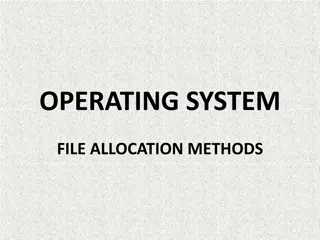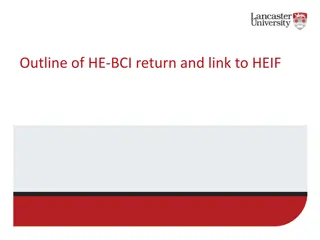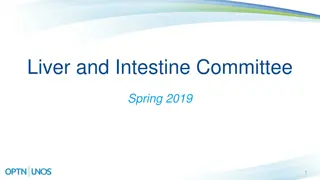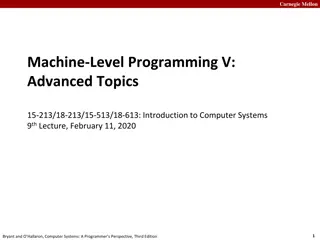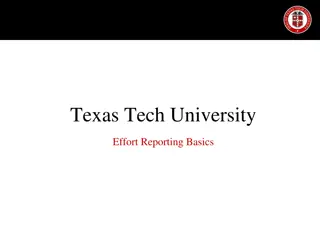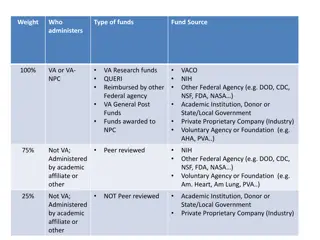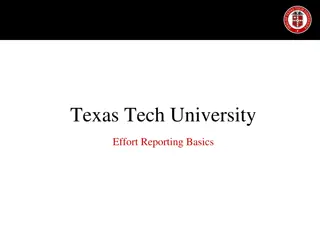Resource Allocation Review Webinar: Enhancing School Improvement Practices
Delve into the essential aspects of Resource Allocation Reviews in the educational setting through this webinar provided by the Office of School and District Improvement. Gain insights on the requirements, tools, and significance of conducting Resource Allocation Reviews to enhance school improvemen
0 views • 25 slides
Java Allocation and C2
Java object allocation and escape analysis play crucial roles in memory management and performance optimization within the Java Virtual Machine (JVM). This comprehensive overview covers topics such as object vs. scalar allocation, object allocation mechanisms, hotspot escape analysis, ideal and conn
2 views • 22 slides
FUTURE OF EFFORT REPORTING
Changes in effort reporting system transitioning from eFECS to ECC for documenting faculty effort and payroll certifications, with unified reporting cycles and improved access to Effort Statements in ECC. GCCRs will maintain the same reporting cycles as Project Statements. Deadline for certification
1 views • 14 slides
Understanding File Allocation Strategies in Operating Systems
Explore various file allocation schemes like extent-based systems, linked allocation, file allocation table (FAT), indexed allocation, and combined schemes used in operating systems. Learn about their pros and cons, including details on maximum file size calculations based on disk block sizes and po
0 views • 20 slides
Operating System: File Allocation Methods
File allocation methods in operating systems determine how files are stored in disk blocks. The main methods include Contiguous Allocation, Linked Allocation, and Indexed Allocation. Contiguous Allocation involves allocating blocks in a contiguous manner for efficient disk space utilization and fast
0 views • 14 slides
Proposed Changes to Forward Capacity Cost Allocation
The document discusses proposed changes to the allocation of forward capacity costs effective June 1, 2020. It highlights the need for transparency in cost allocation, focusing on zonal demand curves and the Marginal-Reliability Impact. The current opaque method is critiqued for potential non-intuit
0 views • 47 slides
Dynamic Memory Allocation in Computer Systems: An Overview
Dynamic memory allocation in computer systems involves the acquisition of virtual memory at runtime for data structures whose size is only known at runtime. This process is managed by dynamic memory allocators, such as malloc, to handle memory invisible to user code, application kernels, and virtual
0 views • 70 slides
Designing 9-Bit RU Allocation Subfield for EHT Trigger Frame in IEEE 802.11-20
IEEE 802.11-20/1845r2 presents a proposal for enhancing the RU allocation subfield design in the EHT Trigger frame to accommodate bandwidth support up to 320MHz and multiple RU or MRU allocations for UL MU transmissions in the 11be standard. The modification addresses inconsistencies in MRU mapping
0 views • 34 slides
IEEE 802.11-20/0985r5 RU Allocation Subfield Design in EHT-SIG
The document discusses the design of subfields in EHT-SIG for RU allocation in IEEE 802.11be, focusing on reducing overhead by considering supported large-size MRU combinations. It addresses concerns on entries overhead in the RU allocation subfield table and the clarity of support for specific MRU
3 views • 24 slides
Overview of HE-BCI Process for HEIF Allocation
Explore the detailed process of HE-BCI data extraction, categorization, and submission for Higher Education Innovation Fund (HEIF) allocation. Understand the key tables and activities involved, including research, business services, community engagement, and intellectual property. Learn how the HEIF
0 views • 6 slides
Understanding How the University Operates: A Comprehensive Overview
Slides and diagrams have been prepared to aid in the orientation of new staff members at the University, detailing the governance structure, decision-making processes, and financial allocation models. Key bodies include the Council, University Executive, and Senate, each playing unique roles in shap
1 views • 9 slides
Overview of Responsibility Center Management (RCM) at Indiana University Bloomington
Indiana University Bloomington implements the Responsibility Center Management (RCM) model for resource allocation, focusing on tuition revenue distribution, assessing central expenses, advantages and disadvantages of RCM, major revenue sources allocation, and central expenses allocation. RCM emphas
0 views • 11 slides
Risk Allocation for Allocation Wells in Energy Law
Definition of allocation wells in energy law, advantages and disadvantages, lessees' rights, allocation of production to mineral owners, and legal cases related to pooling agreements. The content discusses various aspects of risk allocation for unagreed horizontal wells and the importance of clear a
0 views • 16 slides
Spatial Stream Allocation in IEEE 802.11-20 Trigger Frames
The document discusses spatial stream allocation in IEEE 802.11-20 trigger frames, specifically focusing on the SS Allocation subfield. It explains how trigger frames allocate resources for TB PPDU transmissions and solicit User Info fields, detailing the RU Allocation and SS Allocation subfields. T
3 views • 15 slides
Enhancing Heart-Lung Allocation Policy for Organ Transplantation
This project focuses on improving the allocation of heart-lung blocks for organ transplantation by providing clear guidelines to Organ Procurement Organizations (OPOs). The goal is to ensure consistent practices among OPOs across the country, promoting fairness and efficiency in organ allocation. Th
0 views • 11 slides
Effort Reporting Overview and Compliance Requirements
Effort reporting is crucial for demonstrating compliance with federal regulations and institutional standards regarding time commitments and salary charges on sponsored projects. It involves tracking the percentage of time spent on different activities and certifying these efforts. Failure to comply
0 views • 32 slides
Understanding Dynamic Memory Allocation in Programming
Dynamic memory allocation is a crucial concept in programming where programmers use allocators like malloc to acquire memory at runtime for data structures. This process involves managing the heap, maintaining variable-sized blocks, and utilizing functions like malloc, free, calloc, realloc, and sbr
0 views • 33 slides
Update in Liver and Intestine Allocation Policies for Spring 2019
The recent updates in liver and intestine allocation policies for Spring 2019 include eliminating region and DSA from the allocation model, prioritizing medical urgency and proximity, enhancing pediatric candidate considerations, and adjusting weights for DCD and elderly donors. Acuity Circles Alloc
0 views • 15 slides
Understanding Employee Effort: Evidence from Absenteeism Analysis
This study examines the drivers of employee effort through analyzing patterns of absenteeism across firms. The research explores variations in absenteeism levels, investigates whether incentives or employee characteristics influence effort, and identifies firm characteristics that impact absenteeism
0 views • 39 slides
Changes in Capacity Allocation Regulations for Gas Infrastructures in Portugal
The new regulation in Portugal brings significant changes in capacity booking and trading to promote convergence with CAM NC and enable a secondary market. Major changes include ex-ante payment of capacity rights, capacity allocation via a booking platform, and enhancement of liquidity in the second
0 views • 13 slides
Effort Reporting and Export Controls in Research Administration
Effort reporting is a crucial process in research administration to validate personnel charges to awards, while understanding and complying with export control regulations is essential to ensure academic activities meet legal requirements. Effort tracking involves due diligence, communication, and g
0 views • 19 slides
Understanding Memory Layout and Allocation in Computer Systems at Carnegie Mellon University
Exploring the memory layout and allocation in computer systems through lectures at Carnegie Mellon University, focusing on topics such as buffer overflow vulnerability protection, unions, shared libraries, stack, heap, data locations, addresses, and practical memory allocation examples. The content
1 views • 55 slides
Effective Allocation Strategies for Decision-Making
Explore various allocation strategies such as Majority Rule, Random Selection, Authority, and Competition through a scenario of deciding who gets the candy. Analyze the efficiency and fairness of each strategy, consider the balance between economic efficiency and equity, and envision potential impac
0 views • 8 slides
Software Effort Estimation using COCOMO Model
Effort computation and adjustment factors play a crucial role in estimating software development effort. In this detailed guide, we explore the COCOMO model, effort computation using arpma, adjustment factors like cost drivers, and various considerations such as database size, product complexity, an
0 views • 25 slides
Optimization of Heart-Lung Allocation Policy for Organ Procurement Organizations (OPOs)
This document provides guidance to Organ Procurement Organizations (OPOs) regarding the allocation of heart-lung blocks, focusing on resolving issues related to Policy 6.5.E. The aim is to establish clear policies and principles to ensure consistent allocation practices among OPOs nationwide. Throug
0 views • 11 slides
The System for Transparent Allocation of Resources (STAR) Overview
STAR is a framework implemented by GEF to allocate resources among biodiversity, climate change, and land degradation focal areas. It updates the Resource Allocation Framework to maximize impact, promote environmental policies, and meet country priorities through a structured allocation process. The
0 views • 26 slides
E-GRANT: Resource Allocation Tool Features and Development
E-GRANT is an advanced resource allocation tool developed by EGI-Engage for efficiently managing resources allocation for projects related to computing, storage, and VMs. The tool allows customers to send requests, negotiate resources, sign SLAs, and view allocations. It also enables resources provi
0 views • 5 slides
Guidance on Effective Practices in Broader Distribution Operations
The proposal aims to address concerns about cost and transportation in broader distribution operations through the development of a guidance document. It seeks to provide recommendations for optimizing organ distribution and improving overall allocation processes. The effort involves input from vari
0 views • 9 slides
Challenges of Flow Rate Fairness in Network Resource Allocation
Addressing the concept of flow rate fairness in network resource allocation, this content explores its limitations and challenges. Despite being a goal in protocols like TCP, the practicality and enforceability of flow rate fairness are questioned. It highlights the inadequacy of flow rate as a meas
0 views • 15 slides
Texas Tech University Effort Reporting Basics
Effort reporting at Texas Tech University is crucial for accurately reflecting the time spent on professional activities. Effort is defined as a percentage of total professional activity and must be supported by suitable means of verification. Institutional Base Salary (IBS) is the annual compensati
0 views • 20 slides
Understanding Time and Effort Requirements in Organizational Operations
Exploring the significance of time and effort documentation in organizational operations, this content delves into the history, legal aspects, and practical requirements involved. From the basics to compliance measures, it covers why time and effort tracking is essential for entities receiving feder
0 views • 18 slides
Soft Resource Allocation in N-Tier Application Scalability
This research paper explores the impact of soft resource allocation on n-tier application scalability, discussing topics such as over-allocation, under-allocation, bottleneck issues, and proposing a practical algorithm for effective resource allocation. It also covers the performance implications in
0 views • 36 slides
Understanding VERA Research Funding Allocation Process
The VERA (Veterans Equitable Resource Allocation) system determines the distribution of research funds within the VA. VAMCs report their expenditures, which are weighted and summed to calculate a national price. This price is used to allocate funds to individual sites. VERA dollars are distributed t
0 views • 7 slides
Understanding Effort Reporting Basics at Texas Tech University
Effort reporting at Texas Tech University is crucial for accurately documenting the time spent on professional activities. It involves defining effort, understanding institutional base salary, intra-university consulting guidelines, and the role of Principal Investigators in sponsored projects. Comp
0 views • 19 slides
Comprehensive Effort Impact Analysis Template for Operations Evaluation
Comprehensive effort impact analysis template for operations managers and business analysts. Focuses on comparing required effort and resulting impact of operational tasks, aiding in prioritization, workflow streamlining, and productivity enhancement.
0 views • 4 slides
Understanding Effort in Learning at Westside Elementary
Explore the concept of effort through various activities like scoring effort, differentiating showing effort, and making a T-chart of effort behaviors. Watch a video discussing effort and reflect on personal learning in a fun and engaging way at Westside Elementary.
0 views • 8 slides
Effective Asset Allocation Strategies for Investment Success
Investment professionals emphasize the critical importance of the asset allocation decision in shaping investor outcomes. Strategic Asset Allocation (SAA) focuses on long-term goals, while Tactical Asset Allocation (TAA) addresses short-term objectives. Proper navigation through economic cycles invo
0 views • 18 slides
Lean Six Sigma Effort for Local Project Allocation Process Improvement
This initiative focuses on streamlining the local project allocation process using Lean Six Sigma principles. It aims to reduce processing time, improve submission quality, and address issues identified through surveys and assessments.
0 views • 14 slides
Interactive Learning Check: Identifying Low Effort in Testing and Surveys
Engage in an interactive learning check focusing on the limitations of traditional methods to identify low effort in testing and surveys. Explore how response time data is utilized to distinguish between rapid guessing and thoughtful responses. Gain insights into mitigating the impact of low effort
0 views • 5 slides
Time & Effort Reporting in Adult Education - Importance, Regulations, and Compliance
Understanding the significance of time and effort documentation in adult education is crucial for maintaining compliance with federal regulations and securing funding. This involves keeping accurate records of employees' time spent on grant-related activities, adhering to specific guidelines outline
0 views • 25 slides




